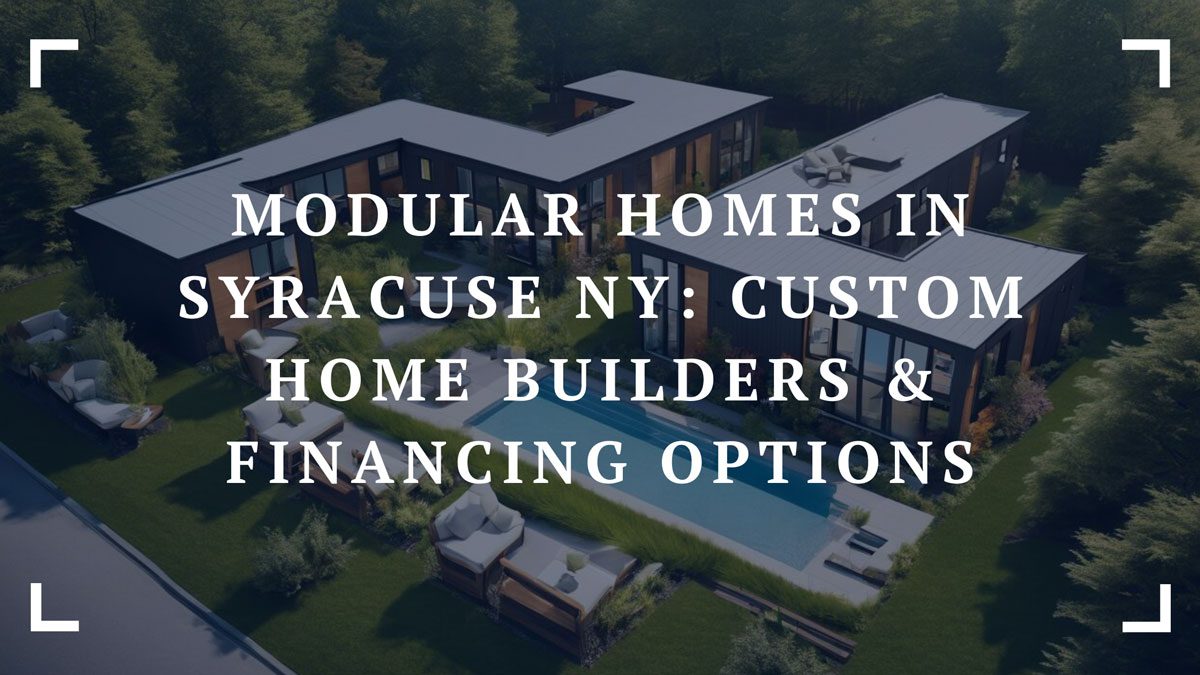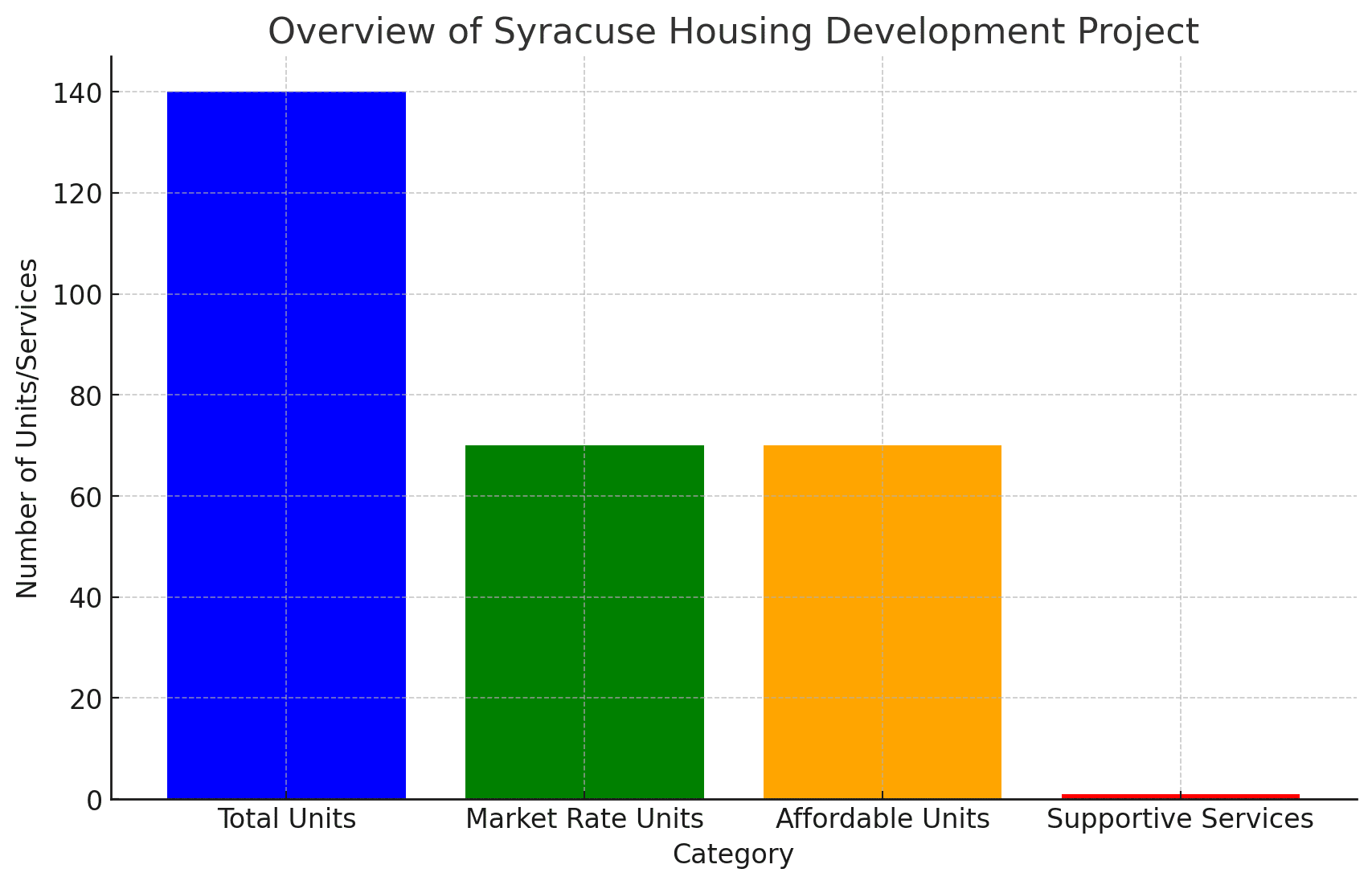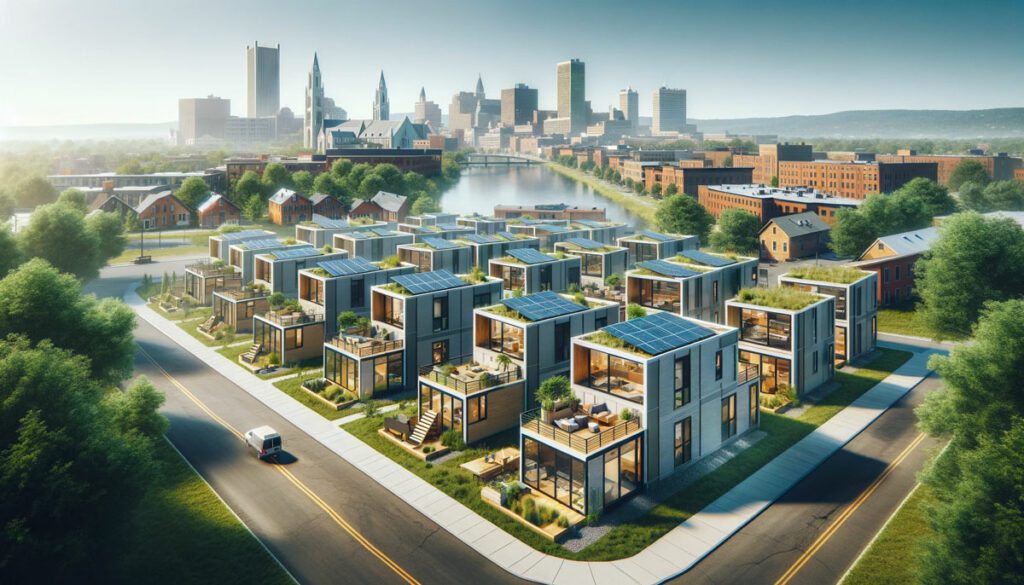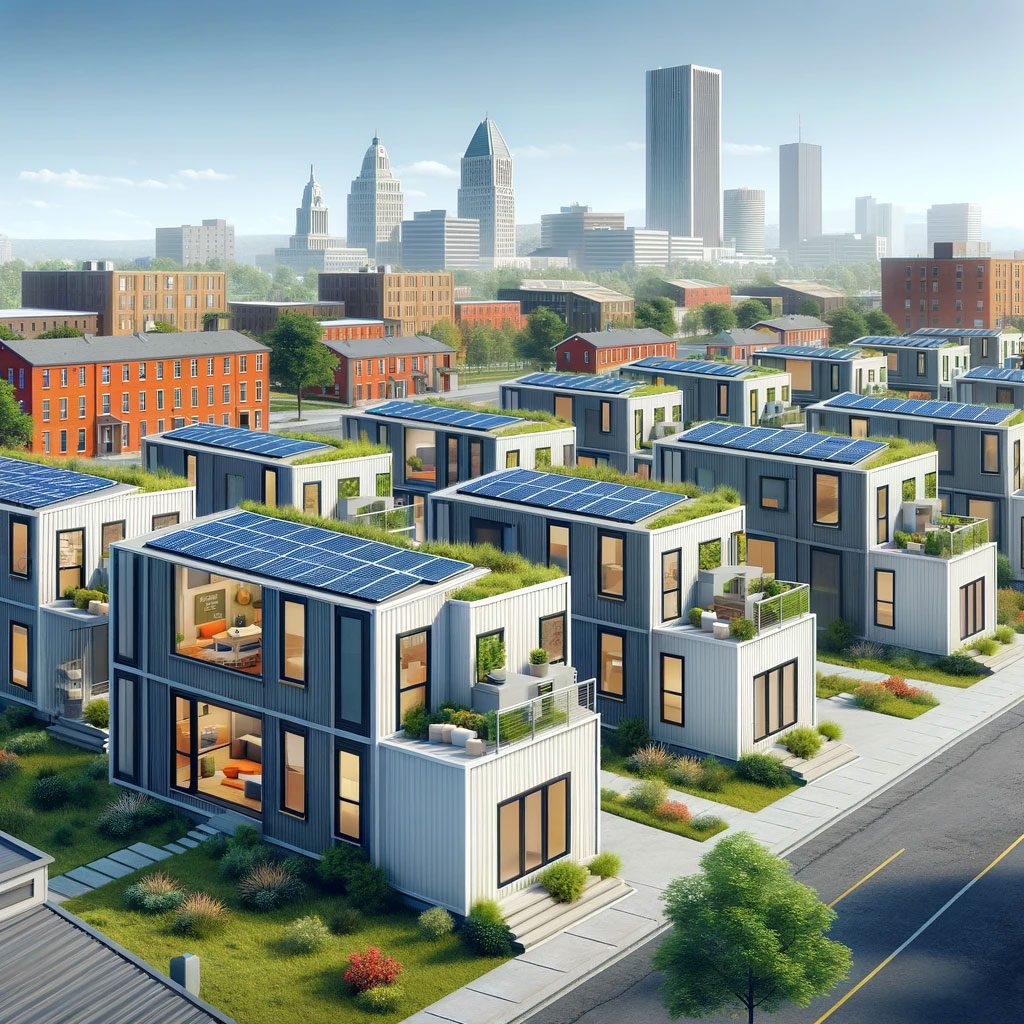Dreaming of owning a unique home, tailored to your taste and lifestyle? Welcome to the future of housing – modular homes. They are reshaping Syracuse, NY’s real estate landscape due to their design flexibility, cost efficiency, and speedy construction. In this blog post, we’ll introduce you to the best custom home builders in Syracuse who can turn your dream into reality, and guide you on various financing options available for modular homes. Embark on a journey with us to unravel how modular homes are becoming the epitome of modern, sustainable living.
Modular homes in Syracuse, NY offer numerous benefits such as faster construction timelines, cost-effectiveness, energy efficiency, and customizable design options. These homes are built off-site in a controlled environment, ensuring high-quality craftsmanship. Moreover, modular homes are known for their durability and adherence to strict building codes and regulations. With their flexibility and affordability, modular homes are an excellent choice for those looking to build their dream home in Syracuse, NY.

Revitalization Project in Syracuse: A New Era for Modular Homes
Syracuse, NY, is witnessing a transformative era in the realm of modular homes, blending modernity with sustainability. The city, in collaboration with the Syracuse Housing Authority, is on the verge of a significant development, thanks to a proposed $50 million federal grant. This ambitious project aims to revitalize the public housing development along East Adams Street, including Pioneer Homes and McKinney Manor.

Key Highlights of the Project:
- One-to-One Housing Replacement: Ensuring that current residents are accommodated in the new development.
- Addition of New Units: Introduction of 140 additional units, split between market rate and affordable housing options.
- Support for Vulnerable Residents: The project includes case management support for residents struggling with mental health, addiction, and other challenges.
Integrated Community Services
A notable aspect of this development is the focus on integrated community services, drawing inspiration from the successful model of Freedom Commons.
Features of Integrated Services:
- Supportive Housing: A critical component, especially for residents needing additional support.
- Services Within the Development: Ensuring residents have easy access to necessary services, enhancing the quality of life.
Financing Options for Modular Homes
In the broader context of modular homes in Syracuse, financing options play a crucial role. Prospective homeowners looking to invest in modular homes can explore various avenues:
- Federal and State Grants: Potential availability of grants for affordable housing projects.
- Traditional Mortgage Loans: Banks and financial institutions offering tailored loans for modular home construction.
- Specialized Modular Home Loans: Some lenders provide loans specifically designed for modular housing.
Collaborating with Custom Home Builders
For those interested in custom modular homes, collaborating with experienced builders in Syracuse is crucial. These builders offer:
- Customization Options: Tailoring homes to individual preferences and needs.
- Sustainability Focus: Incorporating eco-friendly materials and designs.
- Expert Guidance: Assisting through the entire process, from design to completion.
Explore Modular Homes in Syracuse

Are you looking for a new home in Syracuse, NY that combines quality construction, customization options, and affordability? Look no further than modular homes. Exploring modular homes in Syracuse opens up a world of possibilities for homeowners who value flexibility and efficiency in their home-building process.
Modular homes, also known as prefabricated or factory-built homes, are constructed off-site in a controlled factory environment. The modules are then transported to the desired location where they are assembled and finished on-site. This process allows for quicker construction timelines compared to traditional stick-built homes, as weather delays and other on-site challenges are minimized.
But what makes exploring modular homes truly exciting is the vast range of designs and floor plans available. These homes can be customized to fit your unique needs and preferences, from open-concept layouts with spacious kitchens and living areas to cozy cabins tucked away in serene surroundings. Whether you’re dreaming of a sleek modern design or a more traditional aesthetic, modular home builders in Syracuse can bring your vision to life.
Imagine walking into your newly-built modular home in Syracuse, greeted by ample natural light streaming through large windows. The open floor plan seamlessly connects the kitchen, dining area, and living room, creating an inviting space for family gatherings and entertaining friends. The high-quality materials used in construction ensure durability and energy efficiency while maintaining a stylish appearance that reflects your personal taste.
Now that we’ve explored the exciting possibilities of modular homes in Syracuse let’s dive deeper into understanding modular home designs.
Understanding Modular Home Designs

Modular home designs offer homeowners incredible versatility when it comes to creating their ideal living space. Building a custom-designed modular home allows you to have a hand in every aspect of the design process, from selecting the number of bedrooms and bathrooms to choosing the finishes and fixtures that suit your style.
Unlike traditional site-built homes where customizations may be limited, modular homes offer a wide array of design options. Whether you prefer a contemporary aesthetic with sleek lines and minimalist features or a more traditional look that exudes warmth and charm, modular home builders can bring your vision to life.
For instance, if you’re an artist who requires a dedicated studio space, you can work with the builder to incorporate a well-lit, spacious room designed specifically for your creative endeavors. On the other hand, if outdoor living is your passion, consider adding a large deck or patio area where you can unwind and soak up the beautiful Syracuse scenery.
In addition to design flexibility, modular homes also boast high-quality construction materials. These materials are carefully selected to ensure durability and energy efficiency, reducing environmental impact while providing long-lasting comfort and aesthetics.
With an understanding of modular home designs, you now have the knowledge to embark on creating your dream home in Syracuse. But we’re just scratching the surface; there’s much more to explore when it comes to modular homes and their construction materials.
- Modular home designs offer homeowners incredible versatility in creating their ideal living space. With the ability to customize every aspect, from the number of rooms to the finishes and fixtures, modular homes provide a level of personalization that traditional site-built homes may not offer. Whether you prefer a contemporary or traditional aesthetic, modular home builders can bring your vision to life. Additionally, modular homes are constructed using high-quality materials that prioritize durability and energy efficiency, leading to long-lasting comfort and reduced environmental impact. If you’re considering building your dream home, modular homes in Syracuse are worth exploring further.
Materials Used in Construction
When it comes to modular homes, one of the key factors that sets them apart is the materials used in their construction. These materials are carefully selected to ensure durability, efficiency, and sustainability.
| Material Type | Characteristics | Usage in Modular Homes |
|---|---|---|
| Engineered Wood | Designed for structural strength and stability; precision-cut for consistency. | Primary material for framing and structural components. |
| Steel | Provides additional strength; allows for design flexibility. | Used in frames for enhanced stability and unique architectural features. |
| Recycled Insulation | Contributes to energy efficiency; minimizes environmental impact. | Used for thermal efficiency, reducing energy consumption. |
| Low VOC Paints | Reduces indoor air pollutants; safer for environment and inhabitants. | Applied for interior and exterior surfaces, promoting health and sustainability. |
| Energy-Efficient Windows | Reduces energy loss; improves thermal performance of the home. | Installed to enhance insulation and reduce heating/cooling costs. |
One of the primary materials used in the construction of modular homes is engineered wood. This type of wood is specifically designed for structural strength and stability. Unlike traditional stick-built homes, where each piece of lumber is cut on-site, modular homes use precision-cut engineered wood components that are factory-made. This allows for greater accuracy and consistency in the construction process.
Another common material used in modular home construction is steel. Steel frames provide additional strength and stability to the structure, making modular homes highly resistant to seismic activity and extreme weather conditions. Steel also offers design flexibility, allowing for larger open spaces and unique architectural features.
“I was initially skeptical about the quality of materials used in modular homes compared to traditional construction methods. However, after doing my research, I discovered that modular homes actually use high-quality materials like engineered wood and steel which offer superior structural integrity.” – John, a homeowner who recently purchased a modular home.
In addition to engineered wood and steel, modular homes incorporate other sustainable materials such as recycled insulation, low VOC paints, and energy-efficient windows. These elements contribute to the overall energy efficiency of a modular home, reducing energy consumption and minimizing environmental impact.
It’s important to note that not all modular homes are created equal, and the choice of materials can vary depending on the manufacturer and customization options. Therefore, it’s crucial to thoroughly research different modular home builders to ensure they prioritize using quality materials that align with your preferences.
Now that we have explored the materials used in constructing modular homes let’s delve into the benefits and drawbacks associated with these unique dwellings.
- According to a 2019 housing data report, around 6% of all single-family residences in New York State are manufactured or modular homes.
- The US Census Bureau found that as of 2020, the average price per square foot for a new modular home in the Northeast was $124.
- Market Research Future reports predict a growth rate of 6.5% for the modular construction market overall through 2023, potentially leading to an increase in availability and variety for modular homes in areas like Syracuse, NY.
Benefits and Drawbacks of Modular Homes
Modular homes have gained popularity due to their numerous benefits, but like any other housing option, they also come with some drawbacks. Let’s take a closer look at both sides of the coin.
| Aspect | Benefits | Drawbacks |
|---|---|---|
| Construction Timeline | Shorter timelines due to controlled factory environment; minimizes weather-related delays. | Limited architectural freedom compared to custom-built homes. |
| Cost | More cost-effective; streamlined manufacturing reduces waste and material costs. | Potential higher interest rates for modular home financing. |
| Quality Control | Better quality control with thorough inspections before transportation to the site. | Siting challenges due to local regulations and zoning. |
| Energy Efficiency | High energy efficiency with materials like recycled insulation and energy-efficient windows. | |
| Design Customization | Wide range of design options and customization available. |
Benefits:
Imagine being able to design your dream home and have it delivered to your desired location within a few months. That’s precisely what modular homes offer – customizable designs and shorter construction timelines. The controlled factory environment ensures precision and minimizes weather-related delays, allowing for quicker completion compared to traditional on-site construction.
Moreover, modular homes tend to be more cost-effective than their stick-built counterparts. The streamlined manufacturing process reduces waste, and the bulk purchasing of materials lowers overall costs. Additionally, factory construction often results in better quality control, as each module undergoes thorough inspections before being transported to the final site.
Modular homes are also known for their energy efficiency. The materials used in their construction, such as recycled insulation and energy-efficient windows, contribute to lower utility bills and reduced environmental impact. These homes are designed to meet or exceed energy efficiency standards, ensuring comfort while saving on heating and cooling expenses.
Drawbacks:
While modular homes offer many advantages, it’s important to consider some potential drawbacks. One common concern is the limited design flexibility compared to traditional custom-built homes. Although modular homes can be customized within certain parameters, they may not offer the same level of architectural freedom as stick-built homes where every detail can be tailored to specific preferences.
Financing can also be a challenge for some modular homebuyers. Not all lenders are familiar with the financing process for modular construction, potentially leading to limited loan options or higher interest rates. However, as modular homes gain popularity, more financial institutions are becoming knowledgeable about this form of housing and offering suitable financing options.
Additionally, depending on the location and local regulations, siting a modular home may encounter obstacles that could prolong the process compared to traditional stick-built homes. It is important to research zoning and permitting requirements in the desired location to ensure a smooth process from start to finish.
Efficiency and Cost Considerations
When considering building a modular home in Syracuse, NY, it’s essential to take efficiency and cost considerations into account. One of the key advantages of modular homes is their efficient construction process. Since they are built indoors in a factory-like setting, various factors contribute to their cost-effectiveness.
For instance, the controlled environment allows for precise measurements, minimizing material waste. Additionally, the assembly line approach streamlines the construction process and reduces labor costs. These factors collectively make modular homes an attractive option for those looking to build a custom home on a budget.
Efficiency goes beyond just cost savings; it also extends to energy efficiency. Modular homes often incorporate state-of-the-art technologies and environmentally friendly materials that result in reduced energy consumption. By utilizing energy-efficient insulation, appliances, windows, and HVAC systems, modular homes can help homeowners save significantly on utility bills in the long run.
However, it’s important not to overlook certain factors that may influence the overall cost of a modular home. Customizations or upgrades beyond the standard options provided may add to the total expense. It’s crucial to have open communication with the custom home builder about your desired features and budget constraints to ensure realistic expectations and avoid any surprises along the way.
Now that we’ve explored the efficiency and cost considerations of modular homes let’s shift our focus to another vital aspect: adherence to local building regulations.
Adherence to Local Building Regulations
Building regulations play a critical role when constructing any type of home, including modular homes in Syracuse, NY. It’s essential that your chosen custom home builder understands and complies with these regulations to ensure a smooth building process.
Local building codes are put in place to ensure public safety and well-being by establishing minimum requirements for construction quality and structural integrity. These codes set standards for various aspects such as electrical wiring, plumbing, fire safety measures, and accessibility features.
A reputable custom home builder will have a comprehensive understanding of the local building regulations specific to Syracuse, NY. They will work closely with architects, engineers, and subcontractors to ensure that your modular home meets all the necessary code requirements.
For example, in Syracuse, NY, there may be specific regulations regarding insulation requirements to address the region’s weather conditions. Your custom home builder should be well-versed in these specifications and ensure compliance during construction.
By adhering to local building regulations, you can have peace of mind knowing that your modular home is built to meet safety standards and legal requirements. It also helps streamline the permitting process and reduces the risk of any unexpected delays or issues that may arise due to non-compliance.
Now that we understand the importance of adherence to local building regulations, let’s continue exploring the role of custom home builders in the context of building modular homes in Syracuse, NY.
The Role of Custom Home Builders
When it comes to building your dream home, custom home builders play a vital role in turning your vision into reality. These professionals have the expertise and knowledge to bring your ideas to life while ensuring that the construction process is seamless and efficient.
Custom home builders work closely with homeowners to understand their unique needs, preferences, and budget constraints. They take the time to listen and interpret your desires, providing valuable insights and guidance throughout the entire project.
One of the key advantages of working with custom home builders is that they offer flexibility in design. Whether you have a specific architectural style in mind or want to incorporate customized features, custom builders have the skill set to execute your vision.
From the initial design phase to finalizing construction details, custom home builders coordinate all aspects of the building process. They collaborate with architects, engineers, interior designers, and subcontractors to ensure that each element aligns with your expectations.
Not only do custom home builders oversee the construction process, but they are also responsible for managing permits, code compliance, and inspections. They have a comprehensive understanding of local building regulations and can navigate any potential hurdles that may arise during construction.
Imagine having a professional by your side who will turn your dreams into reality while handling all the technicalities behind the scenes. Custom home builders provide that expert touch and peace of mind so you can focus on watching your ideal home come to life.
Financing Options for Modular Homes
Modular homes offer an attractive alternative for those seeking affordable and customizable housing options. However, like any major investment, financing modular homes requires careful consideration. Let’s explore some common financing options available for modular homes.
One option is traditional mortgage financing through banks or credit unions. This involves obtaining a loan based on your creditworthiness and the appraised value of the modular home. Traditional mortgage financing allows you to own the land on which the home is placed and typically offers competitive interest rates.
Another financing option is through modular home manufacturers themselves. Some manufacturers offer in-house financing, where they provide loans to buyers directly. This can be a convenient option as it simplifies the process and may have more flexible terms tailored specifically for modular homes.
If you own land or plan to purchase it separately, you may consider obtaining a construction loan. These loans finance the construction phase of the modular home and are later converted into a traditional mortgage once the home is complete. Construction loans often offer adjustable interest rates and require detailed plans and specifications for approval.
Additionally, some government-backed loan programs, such as those offered by the Federal Housing Administration (FHA) or the U.S. Department of Veterans Affairs (VA), provide financing options specifically designed for modular homes. These programs offer favorable terms and lower down payment requirements, making them accessible to a broader range of buyers.
It’s important to research and compare different financing options to determine what works best for your specific situation. Consider factors such as interest rates, down payment requirements, loan terms, closing costs, and any eligibility criteria associated with each option.
By exploring various financing options, you can make an informed decision that aligns with your financial goals while bringing your vision of owning a modular home closer to reality.


